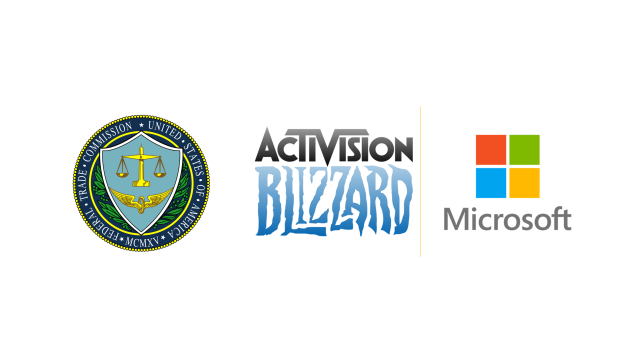FTC's Appeal Challenges Court Ruling On Microsoft-Activision Merger

Table of Contents
The FTC's Arguments Against the Merger
The FTC's appeal centers on its belief that the Microsoft-Activision Blizzard merger would stifle competition and harm consumers. Their arguments are multifaceted and focus on several key areas:
Concerns about Market Domination
The FTC argues that the merger would grant Microsoft an unacceptable level of control, particularly within the rapidly growing cloud gaming market. This concern stems from several factors:
- Market Share Consolidation: Microsoft's acquisition would combine its existing gaming power with Activision Blizzard's extensive portfolio, creating a dominant force. This consolidation could lead to significantly reduced competition.
- Anti-Competitive Practices: The FTC worries that Microsoft could leverage its ownership of popular titles like Call of Duty to exclude competitors, potentially forcing them out of the market or significantly hindering their ability to compete.
- Exclusion of Rivals: The FTC highlights the potential for Microsoft to make Activision Blizzard's games, especially Call of Duty, exclusive to its own platforms (Xbox and PC Game Pass), creating an unfair advantage and limiting consumer choice.
The Importance of Call of Duty
Call of Duty is a central point of contention. The FTC argues that Microsoft could use its ownership of this immensely popular franchise as a lever to harm competitors.
- Leveraging a Key Franchise: The sheer popularity and profitability of Call of Duty makes it a powerful bargaining chip. The FTC fears Microsoft could use it to negotiate unfavorable deals with other companies or even exclude them entirely.
- Exclusivity Concerns: The FTC is concerned that Microsoft might make future Call of Duty installments exclusive to its Xbox consoles and PC Game Pass subscription service, effectively locking out players on PlayStation and other platforms. This would significantly impact competition in the console gaming market.
- Impact on Console Competition: This potential exclusivity would severely disadvantage competitors like Sony PlayStation, which relies on Call of Duty's presence to maintain market share and attract consumers.
Concerns Regarding Future Acquisitions
The FTC also argues that approving this merger would set a dangerous precedent for future acquisitions in the tech industry.
- Precedent for Future Mergers: Allowing this merger could signal that large tech companies can freely acquire competitors without significant regulatory scrutiny.
- Impact on Regulatory Oversight: The FTC fears a weakening of regulatory oversight of large tech mergers, potentially leading to further consolidation and reduced competition across various sectors.
- Long-Term Impact on Innovation: The FTC believes that a lack of competition can stifle innovation and ultimately harm consumers in the long run.
The Court's Initial Ruling and its Reasoning
The initial court ruling allowed the merger to proceed, arguing that the FTC failed to provide sufficient evidence to prove that the merger would substantially lessen competition. The judge's reasoning centered on:
- Insufficient Evidence of Anti-Competitive Behavior: The court found the FTC's evidence insufficient to demonstrate that Microsoft would engage in anti-competitive practices following the acquisition.
- Assessment of Market Dynamics: The court considered the dynamic nature of the gaming market and the presence of numerous other significant players.
- Cloud Gaming Market Analysis: The judge's decision included an assessment of the cloud gaming market's competitive landscape and found that Microsoft’s market share, even with Activision Blizzard, would not be overwhelmingly dominant.
The Implications of the FTC's Appeal
The FTC's appeal introduces significant uncertainty. Potential outcomes include:
- Reversal of the Initial Ruling: The appeal could result in a reversal of the initial court decision, halting or significantly altering the merger.
- Further Legal Proceedings: The appeal could lead to prolonged legal battles, potentially delaying or even preventing the merger indefinitely.
- Financial and Regulatory Consequences: For both Microsoft and Activision Blizzard, a negative outcome could result in significant financial losses and potential regulatory penalties. The uncertainty surrounding the merger's future has already impacted both companies' stock prices.
The Broader Context of Antitrust Law and the Gaming Industry
This case has broader implications for antitrust law and the gaming industry.
- Evolution of Antitrust Law: This case reflects the challenges of applying traditional antitrust frameworks to the rapidly evolving digital landscape and the complexities of the gaming industry.
- Impact on Future Mergers: The outcome will have a significant bearing on future merger activity within the technology sector, particularly in the gaming and entertainment industries.
- Regulatory Scrutiny: The case highlights the increased regulatory scrutiny faced by large technology companies and the need for robust antitrust enforcement in the digital age.
Conclusion
The FTC's appeal against the Microsoft-Activision merger represents a significant challenge to the initial court ruling and highlights ongoing concerns regarding antitrust issues within the gaming industry. The outcome will have far-reaching consequences for both the industry and the broader application of antitrust law in the tech sector. The ongoing legal battle surrounding the FTC's appeal of the Microsoft-Activision merger is crucial and will shape the future of the gaming industry and the definition of fair competition in the digital age. Stay informed about the developments in this crucial case.

Featured Posts
-
 Landman Season 2 Casting Update And The Demi Moore Debate
May 13, 2025
Landman Season 2 Casting Update And The Demi Moore Debate
May 13, 2025 -
 Athlitikes Metadoseis Serie A Odigos Gia Toys Agones
May 13, 2025
Athlitikes Metadoseis Serie A Odigos Gia Toys Agones
May 13, 2025 -
 Cubs Vs Dodgers 2 05 Ct Lineups Broadcast Info And Game Thread
May 13, 2025
Cubs Vs Dodgers 2 05 Ct Lineups Broadcast Info And Game Thread
May 13, 2025 -
 Third Babys Gender Revealed Cassies Special Birthday Announcement For Alex Fine
May 13, 2025
Third Babys Gender Revealed Cassies Special Birthday Announcement For Alex Fine
May 13, 2025 -
 Angel Has Fallen The Characters Their Motivations And Relationships
May 13, 2025
Angel Has Fallen The Characters Their Motivations And Relationships
May 13, 2025
